Navigating Plumbing and Heating Emergencies

Introduction:
When a plumbing or heating emergency strikes, it can catch you off guard and potentially lead to extensive damage if not handled properly. While some minor issues can be addressed temporarily, it’s crucial to recognize the situations where professional intervention is needed. In this blog, we’ll guide you through essential steps to take during a plumbing or heating emergency and underscore the significance of involving experts for critical issues.
1. Stay Calm and Assess the Situation:
The first rule in any emergency is to remain calm. Panicking can lead to hasty decisions that worsen the situation. Assess the severity of the problem. Is it a leak, a burst pipe, a malfunctioning heater, or something else? Understanding the problem’s nature will help you determine the appropriate response.
2. Shut Off the Water or Gas:
If the emergency involves a water leak or pipe burst, locate the main water shut-off valve and turn it off to prevent further water damage. In cases of gas leaks or suspected gas leaks, turn off the gas supply and ventilate the area by opening windows and doors.
3. Contain the Issue Temporarily:
For minor leaks, you can use tools like plumber’s tape or a bucket to temporarily contain the water. However, remember that these are temporary fixes, and professional assistance is needed to address the root cause.
4. Call a Professional:
When dealing with plumbing or heating emergencies, the best course of action is to call a licensed professional. A professional plumber or HVAC technician has the expertise and tools to diagnose the problem accurately and provide a lasting solution.
5. Evacuate in Dangerous Situations:
If a gas leak or other emergency poses an immediate threat to safety, evacuate the area and call emergency services. Your safety and that of your family should always be the top priority.
6. Document the Situation:
Take pictures or videos of the emergency situation. These visuals can be helpful for insurance claims and when explaining the issue to professionals.
7. Avoid DIY Fixes for Complex Issues:
While you might be tempted to attempt DIY fixes, it’s important to avoid this for complex plumbing and heating issues. Incorrect repairs can exacerbate the problem and potentially void warranties.
8. Regular Maintenance Can Prevent Emergencies:
Regular maintenance of your plumbing and heating systems can significantly reduce the likelihood of emergencies. Schedule routine inspections and maintenance checks to catch issues before they escalate.
Conclusion:
Being prepared for plumbing and heating emergencies is essential for safeguarding your home and your family’s well-being. While you can take temporary measures for minor issues, never underestimate the importance of involving professionals for critical problems. Remember, quick action and involving experts are key to minimizing damage and ensuring a safe and comfortable living environment.


